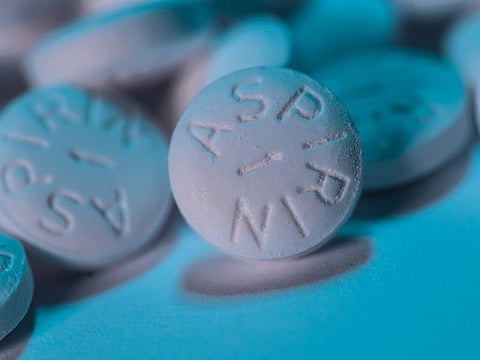An aspirin a day crucial for heart attack survivors: Study
Aspirin is mandatory following a heart attack due to its ability to prevent blood clot

London: Heart attack patients who do not take daily aspirin are more likely to have a repeat myocardial infarction, stroke, or death than those who take the drug consistently, a new study said on Tuesday.
According to the study presented at ESC (European Society of Cardiology) Congress 2023, aspirin is mandatory following a heart attack due to its ability to prevent blood clot formation, and thus reduce the risk of a new heart attack or stroke.
"Our findings suggest that not taking aspirin as prescribed after a heart attack is linked to a higher risk of having another heart attack, a stroke or dying," said study author Dr Anna Meta Kristensen of Bispebjerg and Frederiksberg Hospital, Denmark.
The study used data from Danish nationwide health registries, including patients aged 40 years and over who had a first-time heart attack from 2004 through 2017, were treated with a coronary stent and took aspirin as prescribed during the first year after their heart attack.
Adherence to aspirin was evaluated at two, four, six and eight years after the heart attack.
The proportion of days patients had their pills over the previous two years was used to calculate aspirin adherence at each of the four-time points.
According to the study, patients on aspirin for 80 per cent or less of the time were considered non-adherent (i.e., not taking aspirin as prescribed) while those on aspirin more than 80 per cent of the time were considered adherent (i.e., taking aspirin as prescribed).
"We assessed the effects of long-term aspirin use in patients who were not receiving other medications for the prevention of heart attack or stroke," Kristensen said.
The study included 40,114 patients with a first-time heart attack. Adherence to aspirin progressively declined with each time point, from 90 per cent at two years following the heart attack to 84 per cent at four years, 82 per cent at six years and 81 per cent at eight years.
The researchers investigated whether patients who did not take aspirin as prescribed had a higher risk of the composite outcome of recurrent heart attack, stroke, or death when compared to those who took aspirin consistently.
Patients who took aspirin as prescribed were less likely to experience the composite outcome than non-adherent patients at each time point, the study said.
Compared with adherent patients, non-adherent patients had a 29 per cent, 40 per cent, 31 per cent and 20 per cent higher likelihood of recurrent heart attack, stroke or death at two, four, six and eight years following the heart attack, respectively.
Sign up for the Daily Briefing
Get the latest news and updates straight to your inbox







